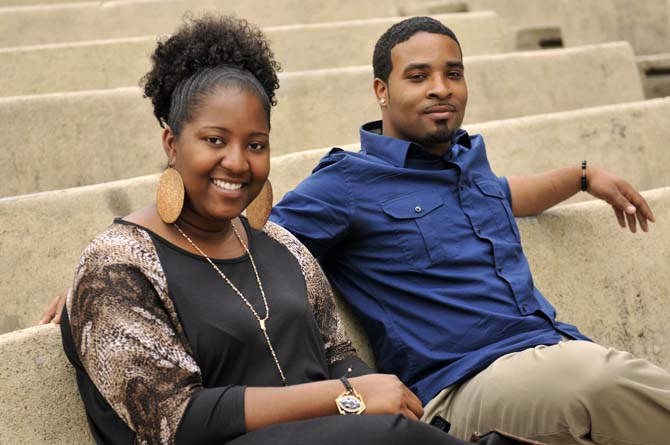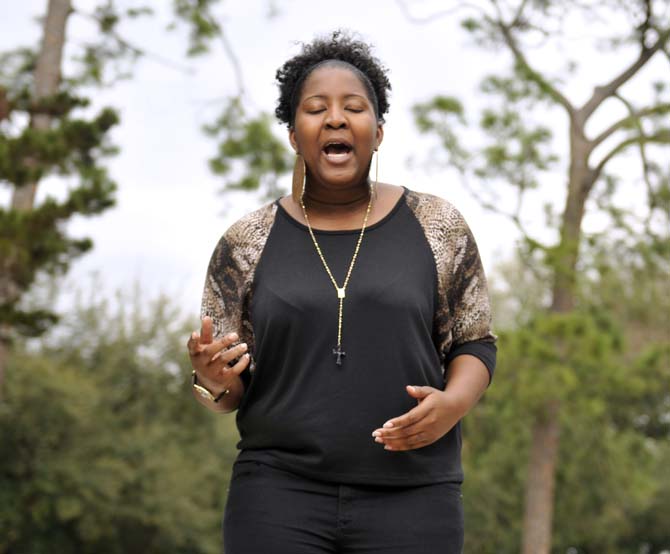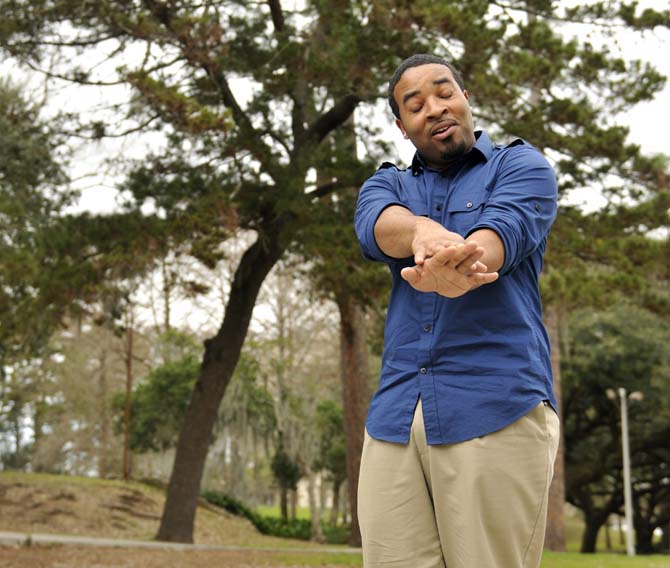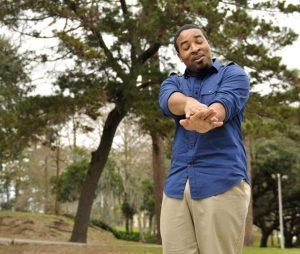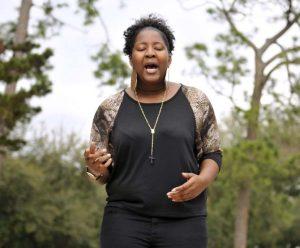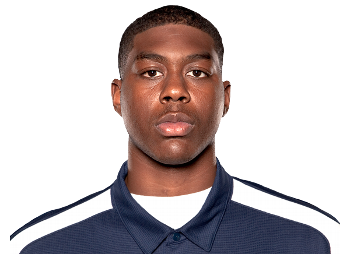Tonight’s A Night With Maya Angelou event has sold out the Union Theater and taken over campus conservation, but for two University students, it all comes down to a spotlight and a microphone.
Winning the University’s Mic With Maya poetry slam competition two weeks ago gave Eric Couto, English senior, and Jonosha Jackson, English and African and African American Studies senior, the opportunity of a lifetime. The two winners will take the stage to perform their Angelou-inspired poems in the Union Theater tonight, before meeting Angelou herself at the reception afterward.
Couto and Jackson sat down for a Q&A with The Daily Reveille on Monday.
The Daily Reveille: How are you feeling about your performance coming up?
Couto: Ladies first.
Jackson: I’m pretty excited. This is like a pivotal moment for me as an artist and in my life.
Couto: I’m definitely gonna use the adjective “ecstatic.” I mean, think about it. I’m a writer — I don’t want to say a poet until tomorrow when I meet her — then I’ll be a poet. But this is Maya Angelou. She is one of the most influential figures of the renaissance of writing poems. She’s like the Mother Nature of poetry, not just of African-American poetry, but poetry period. When you mention Shakespeare and Robert Frost, you’ve got to mention Maya Angelou and Langston Hughes, the people who really poured their hearts out. So tomorrow, meeting her? I started writing little poems like, “I like the way you smile.” I get to meet her tomorrow. I can’t put that into words.
TDR: How do you prepare for something like this?
Jackson: I mean, I think it’s the same routine every time. I keep going over my poem in my head, keep saying it to myself, but it’s always different when you step onstage. You never perform it exactly how you did when you were backstage. You’re just gonna let it all out, and if you mess up, you mess up, and you just keep on going. So this preparation hasn’t been special, but I think the performance will be special.
Couto: As for me, you prepare the best way you know how, you know? For me, all I’m gonna do is say the poem a few times, like little challenges, test myself how fast I can say it, test myself how slow I can say it, to see if I really remember it. Other than that, when you get to the stage, before you go on, don’t put any pressure on yourself or say anything crazy to yourself. “You better not suck.” Don’t do that. All you do is not think about it, and when you don’t think about it, it should just come naturally. Just spit clean out. You don’t have any mechanics, you don’t roboticize yourself into what you’re gonna do. You don’t plan ahead. What happens is what happens. It’s natural.
TDR: So have you put a lot of thought into what it’s going to be like when you meet her?
Jackson: No. I’m pretty… I don’t know. I’m just so excited. I feel like a little kid again. I’m gonna be able to meet Maya Angelou. She’s like the goddess of poetry, you know what I’m saying? I definitely feel like I’m gonna be like, “I don’t know what to say. I don’t even know how I’m even gonna interact with you. Can I shake your hand?” It’s gonna be amazing but I’m gonna be a little kid when I get in that room, I pretty much guarantee it.
Couto: My first thought: don’t faint. “Hey, how’re you doing, I’m…” [faints] I don’t want to do that. It’s one thing to see pictures of someone, it’s another thing to watch them on YouTube, but to have that person — because I didn’t think she was really going to be here physically, I thought it was going to be like a jumbotron or something and I’d spit for the electronic version of her — but to have that person here, it’s gonna be like, “Oh… wow… how you… hey, I have little poems for you…” It’s gonna be something serious.
TDR: Why don’t both of you talk a little bit about what you wrote and how you perform it and what went into it and what inspired it?
Jackson: The piece I wrote is called “Fourth of July.” I was definitely inspired by her “I Know Why the Caged Bird Sings.” A lot of people don’t know that she was diligently working in the civil rights movement, so the piece itself is about freedom and gaining your independence, not only as an African-American and as a woman. It’s about being able to voice your opinions and show how vulnerable you are and even just how you feel about the leaf falling from the tree, how you want to sing about your pains, but it’s so hard so you just have to hum sometimes. I think it’s definitely a liberation piece in a sense, but it also constructs and talks about the sorrows and the woes of a woman and how you never really know what someone’s going through, but at the same time, if you’re about to sing or you’re able to actually gain independence, there’s so much more to life than that.
Couto: I feel the same way [Jackson] does. I was told that for this particular moment we’d have to write a tribute poem to Maya Angelou. Aside from her being in the civil rights movement and being such a great activist, I wanted to go with something much more personal. Although we’re here to talk business, I want something that’s really going to pull it out of you. So I decided to take 10 of her poems, “I Know Why the Caged Bird Sings,” “Still I Rise,” of course, “A Brave and Startling Truth,” “Alone,” “The Rock Cries Out Today” and a few others. And I took those poems, sat them side by side by side by side, and I stripped them, dissected them, just thought about it, and then I put them into a new arrangement of one poem. And it’s exactly the way I would write a poem if I had never heard of Maya, but all of them are her words. I thought she could be a person who would find that pretty decent. I call it “The Caged Bird Rises.” It talks about the present state of mind and the things that man is willing to do. And it just talks about the correction of how we need to learn to forgive each other and understand that love and life are necessary and to grow.
TDR: When you won the competition and you first found out you were going to be doing this, what was going through your head?
Jackson: Well, when I first found out, I thought I was just going to be able to meet her. I didn’t know I was actually going to be able to perform until days after that. And I was like, “What!” I was in my house by myself and I’m super-hyped, I’m like, “Who do I call first to tell them I’m performing for Maya Angelou?” I was definitely like, man, this is major. This is beyond me. How many artists do you know that can say, “Hey, I performed for Maya Angelou?” Or, “Hey, I’ve met her before?”
TDR: It’s definitely once in a lifetime.
Jackson: Right, exactly. And to say that we’re so young, I think, and not even at the peak of our careers, it’s just amazing. Amazing.
Couto: “Grab the iPhone. Call your grandmother. Call her.” That’s the first thing I thought. “She’s not going to believe this.” Before the competition, once I knew that I’d be trying, I told her, “I have a surprise for you. I don’t know if I’m gonna win the surprise, so I can’t tell you what it is right now.” So I called her and I said, “Remember how I had a surprise for you? Well, I won the competition, and I’m performing for Maya Angelou.” Shouldn’t have told her that. She was like, [imitates crying] “Oh my God, I just love you.” And I’m like, “Good, but you know what, I talked to them and they’re gonna get you a ticket, so you’re gonna get to see me perform and you get to see her.” And she just lost it. I definitely have to call Sprint to make sure they don’t overcharge me for her feelings.
TDR: Your families must have been floored.
Jackson: My mom was like, “What? You get to do what?” She was super excited, and then the mushy feelings came on after that. My mom and my dad were definitely like, “We have to celebrate. This is definitely worth celebrating.”
Couto: It’s just me and my grandmother, so we just did the Wobble on our own and enjoyed ourselves a little.
TDR: They’re going to be in attendance, so when you’re up there, do you think you’re going to be thinking about Maya Angelou, or are you going to be thinking about your mom and your grandma sitting in the crowd?
Jackson: I don’t know what I’m gonna be thinking about. Sometimes you get on stage and you’re not even thinking about your performance at all. Those words are just coming out of you, but at the same time, your mind is just somewhere else. So I definitely don’t know what’s gonna happen, but I’m gonna try my best to live in the moment, because it’s once in a lifetime.
Couto: Every time I perform, the first thing I think is, “What is going on right now?” I never remember what happens. It’s supposed to be instinct. You don’t think anything. Impulse. The only thing I want to do is make sure the audience feels my feeling and emotion. If they feel it, they feel it, cool. If they don’t, they don’t, I can’t change that.
TDR: Do you have any moment’s perspective when you’re preparing for this where you think that all the time you’ve been writing and studying has been leading up to an opportunity like this?
Jackson: I think this is just the beginning for both of us. I’ve known [Couto] since my freshman year here. We met in poetry class, actually. This guy was amazing then, and he’s like 10 times more amazing now.
Couto: Stop it, stop it.
Jackson: I’m just keeping it real. In school I’m like, this guy, this is just the bottom of it, I think. I don’t even know if all that other stuff counts.
Couto: This is like the beginning for us. Like she said, we’ve both put a lot of blood, sweat and tears into it. We’ve been here, and we’ve been very quiet about it. We haven’t been bragful. Well, we have been bragging, but we haven’t been boastful. We haven’t done anything. All we do is show up to places and perform for free. Basically we go out there and we perform for other people. This is not for me. This is for you to understand what I feel and try to understand me, for one. And also if you have a story and you have something to say, we can talk. It’s like a community service thing.
Jackson: [laughs] I like that.
Couto: It’s about the after effect. “You know, I went through something like that too.” “Me too, man.” It’s OK, we can talk about it. It’s that relief, like when I get the relief of writing with a pen, sometimes people don’t get that because not everybody’s a writer. So when they come up to me and we talk, that’s them relieving themselves with their imaginary pen. So that’s the true reward of it, if you want to look at it like that. And this is just the beginning for us.
TDR: I’m sure just having this experience is going to open up doors for the two of you.
Jackson: I’m gonna add this to my résumé, like, “Look.”
Couto: “Alright, look, I deserve the job, but you go ahead and Google. I performed for Maya Angelou.”
TDR: Is there anything else you want to just throw out there about yourselves or what you want people to know or what you want them to think?
Couto: I just want people to know, I’m putting myself out there. I’m telling you a part of my life. I definitely want you to understand it. You take it seriously if you want to. If you don’t want to, I’ll try to make you take it seriously. [Laughs.] Everybody’s their own writer. Everybody does what they want to. I’m just here to help you try to understand, and also to grow as a person. Everybody needs to grow. I feel like some of the best teachers are poets. And I’m not talking about just teachers with a book, I’m talking about just teachers. They teach you life lessons, sometimes directly, sometimes indirectly. I just want people to learn. I’m not trying to sound like Miss America, but I mean, I’m serious. This is why I started this. And another thing about poets that people don’t know is always, always, nine times out of 10, every poet has gone through something drastic. Drastic. That’s why we have these voices, because we want you to understand that what you’re going through may not be that bad, and if it is, like I said, let’s talk about it, make you feel better. It makes me feel better when I’m out there.
Jackson: You definitely made the point that I was going to make. Every poet has been through something big in their life. Or even artists period. I think to be a great artist you have go through something traumatic, and it sucks sometimes, but I think you definitely have to have experienced the trauma of something. And then through that trauma, it becomes something beautiful through your voice and your emotions.
Couto: Think about it like this: imagine a hurricane mixed with a tornado mixed with a rainstorm, a cyclone, a tsunami, an earthquake. That’s what every poet has gone through, or feels. Maybe it’s not as big as some of the other storms, but it’s there.
“When we come to it
We must confess that we are the possible
We are the miraculous, the true wonder of this world
That is when, and only when
We come to it. “
-From “A Brave and Startling Truth.”
“Through all the bright hours
I cling to expectation, until
darkness comes to reclaim me
as its own. Hope fades, day is gone
into its irredeemable place
and I am thrown back into the familiar
bonds of disconsolation.
Gloom crawls around
lapping lasciviously
between my toes, at my ankles,
and it sucks the strands of my
hair. It forgives my heady
fling with Hope. I am
joined again into its
greedy arms. “
-From “A Plagued Journey”
“The caged bird sings
with a fearful trill
of things unknown
but longed for still
and his tune is heard
on the distant hill
for the caged bird
sings of freedom. “
-From “I Know the Caged Bird Sings”
“I say, clap hands and let’s come together in this meeting ground,
I say, clap hands and let’s deal with each other with love,
I say, clap hands and let us get from the low road of indifference,
Clap hands, let us come together and reveal our hearts,
Let us come together and revise our spirits,
Let us come together and cleanse our souls,
Clap hands, let’s leave the preening
And stop impostering our own history.
Clap hands, call the spirits back from the ledge,
Clap hands, let us invite joy into our conversation,
Courtesy into our bedrooms,
Gentleness into our kitchen,
Care into our nursery.”
-From “Million Man March”
“You, created only a little lower than
The angels, have crouched too long in
The bruising darkness
Have lain too long
Facedown in ignorance,
Your mouths spilling words
Armed for slaughter.”
-From “On the Pulse of Morning”
“There are some millionaires
With money they can’t use
Their wives run round like banshees
Their children sing the blues
They’ve got expensive doctors
To cure their hearts of stone.
But nobody
No, nobody
Can make it out here alone.”
-From “Alone”



